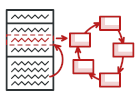
Стан на C++
Стан — це поведінковий патерн, що дозволяє динамічно змінювати поведінку об’єкта при зміні його стану.
Поведінки, які залежать від стану, переїзджають в окремі класи. Початковий клас зберігає посилання на один з таких об’єктів-станів та делегує йому роботу.
Складність:
Популярність:
Застосування: Патерн Стан часто використовують в C++ для перетворення в об’єкти величезних стейт-машин, побудованих на операторах switch.
Ознаки застосування патерна: Методи класу делегують роботу одному вкладеному об’єктові.
Концептуальний приклад
Цей приклад показує структуру патерна Стан, а саме — з яких класів він складається, які ролі ці класи виконують і як вони взаємодіють один з одним.
main.cc: Приклад структури патерна
#include <iostream>
#include <typeinfo>
/**
* The base State class declares methods that all Concrete State should
* implement and also provides a backreference to the Context object, associated
* with the State. This backreference can be used by States to transition the
* Context to another State.
*/
class Context;
class State {
/**
* @var Context
*/
protected:
Context *context_;
public:
virtual ~State() {
}
void set_context(Context *context) {
this->context_ = context;
}
virtual void Handle1() = 0;
virtual void Handle2() = 0;
};
/**
* The Context defines the interface of interest to clients. It also maintains a
* reference to an instance of a State subclass, which represents the current
* state of the Context.
*/
class Context {
/**
* @var State A reference to the current state of the Context.
*/
private:
State *state_;
public:
Context(State *state) : state_(nullptr) {
this->TransitionTo(state);
}
~Context() {
delete state_;
}
/**
* The Context allows changing the State object at runtime.
*/
void TransitionTo(State *state) {
std::cout << "Context: Transition to " << typeid(*state).name() << ".\n";
if (this->state_ != nullptr)
delete this->state_;
this->state_ = state;
this->state_->set_context(this);
}
/**
* The Context delegates part of its behavior to the current State object.
*/
void Request1() {
this->state_->Handle1();
}
void Request2() {
this->state_->Handle2();
}
};
/**
* Concrete States implement various behaviors, associated with a state of the
* Context.
*/
class ConcreteStateA : public State {
public:
void Handle1() override;
void Handle2() override {
std::cout << "ConcreteStateA handles request2.\n";
}
};
class ConcreteStateB : public State {
public:
void Handle1() override {
std::cout << "ConcreteStateB handles request1.\n";
}
void Handle2() override {
std::cout << "ConcreteStateB handles request2.\n";
std::cout << "ConcreteStateB wants to change the state of the context.\n";
this->context_->TransitionTo(new ConcreteStateA);
}
};
void ConcreteStateA::Handle1() {
{
std::cout << "ConcreteStateA handles request1.\n";
std::cout << "ConcreteStateA wants to change the state of the context.\n";
this->context_->TransitionTo(new ConcreteStateB);
}
}
/**
* The client code.
*/
void ClientCode() {
Context *context = new Context(new ConcreteStateA);
context->Request1();
context->Request2();
delete context;
}
int main() {
ClientCode();
return 0;
}
Output.txt: Результат виконання
Context: Transition to 14ConcreteStateA.
ConcreteStateA handles request1.
ConcreteStateA wants to change the state of the context.
Context: Transition to 14ConcreteStateB.
ConcreteStateB handles request2.
ConcreteStateB wants to change the state of the context.
Context: Transition to 14ConcreteStateA.